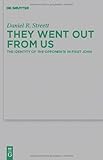In Amos 7:1 LXX we have a most intriguing passage. Most English translations read something like this: “The sovereign LORD showed me this: I saw him making locusts just as the crops planted late were beginning to sprout. (The crops planted late sprout after the royal harvest.)” (NET Bible)

Master Po asks, "Do you hear the grasshopper at your feet?"
Gog the Grasshopper
The LXX, however, reads: οὕτως ἔδειξέν μοι κύριος καὶ ἰδοὺ ἐπιγονὴ ἀκρίδων ἐρχομένη ἑωθινή καὶ ἰδοὺ βροῦχος εἷς Γωγ ὁ βασιλεύς. In English: “Thus the Lord showed me, and behold, a swarm of locusts coming early, and behold, one locust, Gog, the king.” It’s possible that the translator has seen in Amos 7:1 a link to Joel’s locust army, which comes from the north (Joel 2:20), and has thus linked it to Ezekiel’s Gog, which also comes from the north (Ezek 38:15). Of course, he could also have talked to Eldad and Medad, who gave him the inside scoop.
Gog Elsewhere in the LXX
Within the LXX (and Samaritan Pentateuch), Gog is mentioned, of course, throughout Ezekiel 38-39, but also, intriguingly, at Num 24:7, where MT has “Agag” instead. We will explore Num 24 LXX in a future post, but for now, let it suffice to note that it speaks of a person (ἄνθρωπος) who will come to rule many nations. Gog is specifically singled out as one whose kingdom will be surpassed or excelled by this person’s coming kingdom (καὶ ὑψωθήσεται ἢ Γωγ βασιλεία αὐτοῦ). Thus, Num 24 may be one reason the LXX translator saw Amos 7 depicting Gog as a king. In Vaticanus, Deut 3:1, 13 read Γωγ instead of Ὠγ as the king of Βασάν. Og, of course, also takes on mythic proportions in Jewish tradition.
Gog and the Apocalypse
Why is this important for NT students to know? Well, it opens up the possibility that the abyss-sourced locust army in Revelation 9:1-11 is recalling Amos 7. This possibility is especially suggested by the way Rev 9:11 makes special mention of the angelic king of the locusts, giving his name in both Hebrew and Greek: Abaddon/Apollyon. If John is drawing on Amos 7, then it would appear that he thinks of Gog, locust-king, as an angel.
One more thing: since John actually mentions Gog by name in Rev 20:7-9, it may be that we should see this as recapitulating Revelation 9’s demon-locust army attack.
And here you thought I was going to talk about the Russians!








Thanks for this post, Daniel. I spent several years checking the LXX references in John’s Revelation during my doctoral research and what you wrote makes much sense. BTW, I also teach Greek in my Seminary and how I wish what you said could be implemented. In the Asian context we probably need another generation for the paradigm shift you argued for. We start Greek only in the second year of the MDiv and it goes for 3 Semesters. Hardly enough.
Thanks for reading and commenting, Tony! That’s interesting about Greek in the Asian context. I had a student from Hong Kong tell me that seminaries there use Mounce’s grammar translated into Mandarin–do you have something similar where you are? I imagine that learning Greek through two other languages (English and Mandarin) would be quite difficult and confusing.
Daniel, I would not know what Chinese learners of Greek use for their textbook. Here in Singapore I teach Greek in English (I am bilingual – English & Malay and I speak little Mandarin) and I use Clayton Croy’s and W. Morrice’s books as my main texts. Mounce’s grammar is good but he starts with nouns which I find unhelpful in getting my students to read Greek as soon as possible. Thanks for your posts on the LXX and its relevance in interpreting the NT. Often students of Hebrew and Greek fail to recognize that the Bible of the early Church was the Greek Septuagint.
Is there an English translation of the LXX that correctly translates Amos 7:1? What is the most accurate, literal English translation of the LXX or something similar?
Pingback: Judas Maccabeus and the Downfall of “Gog” – Mattathias and his Mighty Maccabees
Prov 30:27 says The locusts do not have a King which means this particular Locust in Amos 7:1 must be an allusion to a locust like rule
Pingback: Judas Maccabeus and the downfall of Gog – Judas Maccabeus and the Downfall of Gog
Pingback: Judas Maccabeus and the downfall of Gog | Daniel Man of Visions and Dreams
Well, a fallen angel? How does that square with Ezekiel 39:4 where Gog falls and god says, “I will give you to the birds of prey…?” Since when can an angel, demonic or otherwise, be devoured by birds and “beasts of the field?”
Watching the news today about Russia bombing the grain ships I couldn’t help but think about the Gog Magog connection. Locust destroy grain, it’s what they do. It feels connected to me.